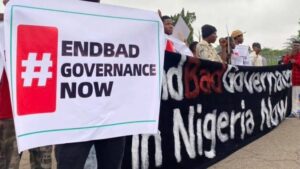As Nigerians took to the streets to make their voices heard in the ongoing protests, many were left frustrated by disruptions to their internet and telecommunications services. The partial network downtime experienced by subscribers across the country has become a source of concern, with many speculating that the outages may be deliberately orchestrated to impede the flow of information and organization of the demonstrations.

According to industry sources, the network issues, which began on Thursday, are linked to damaged fiber optic cables and external sabotage. “A fiber manhole of one of the operators was set ablaze along Lekki Epe Expressway,” one source revealed, indicating that the network operators are currently working to resolve the problem.
The impact of these disruptions has been felt acutely by protesters, who rely on social media platforms and instant messaging services to coordinate their activities and share updates. Many have taken to the X platform (formerly known as Twitter) to express their frustration, with one user, @isaaczara, asking, “I just noticed that my MTN and Airtel network is down for no reason. Is it just me?”
Others, like Chisom Nwokwu and Lola Okunrin, have reported similar issues with their MTN and Glo networks, with Lola Okunrin questioning, “Why is MTN network messy today of all days?”
The perceived link between the network disruptions and the ongoing protests has led some subscribers to accuse the government of orchestrating the outages to hinder the movement. Chude Nnamdi, for instance, tweeted, “MTN network is the government puppet,” while Collins@FCBCollins wrote, “Just this morning MTN Network and GLO network are not working properly on 1st of August. Probably to hinder the protest.”
In a bid to circumvent the network issues, some protesters have turned to using VPNs, which have reportedly improved their internet speed and access to the X platform. As one user, @Toriah, advised, “Save yourself the stress, just use VPN.”
While the network operators have acknowledged the downtime and claimed to be working on resolving the issue, the timing and nature of the disruptions have raised concerns among the public. Many have expressed their disappointment and anger, viewing the network issues as a deliberate attempt to stifle the voices of those demanding better governance and accountability.
The protests, which have been gaining momentum in recent weeks, have become a rallying cry for Nigerians who are fed up with the country’s economic, social, and political challenges. The partial network downtime has only served to exacerbate the frustrations of the protesters, who see it as a further obstacle to their ability to organize and share their message.
As the situation continues to unfold, it remains to be seen whether the network operators will be able to restore full service in a timely manner, or if the disruptions will persist, further fueling the anger and determination of the protesters. Regardless, the events of the past few days have highlighted the crucial role that technology and communication play in the modern era of activism and social movements.




